Rethinking Bands, the Cloud, and the Crowd
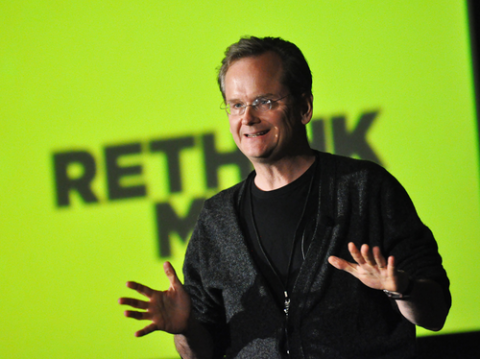
Harvard professor Lawrence Lessig talks about the future of music, technology, and business at the Rethink Music conference.
Photo by Phil Farnsworth

Emily Haines of the band Metric performs at the April 25 Harvard conference kickoff.
Photo by Phil Farnsworth
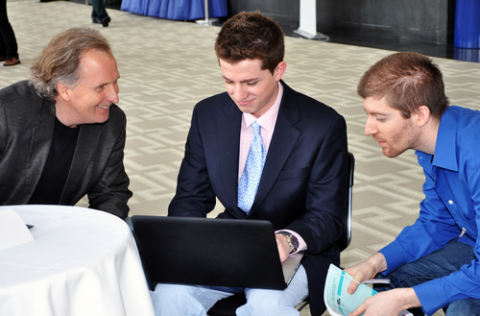
Berklee president Roger H. Brown checks out music online with students Charlie Puth and Ben Camp.
Photo by Phil Farnsworth

Soul singer Black Joe Lewis appears in a private concert for conference attendees.
Photo by Phil Farnsworth

Who says you can't force creativity? Amanda Palmer plays uke in the "8in8" challenge to write eight songs in eight hours at Rethink.
Photo by Phil Farnsworth
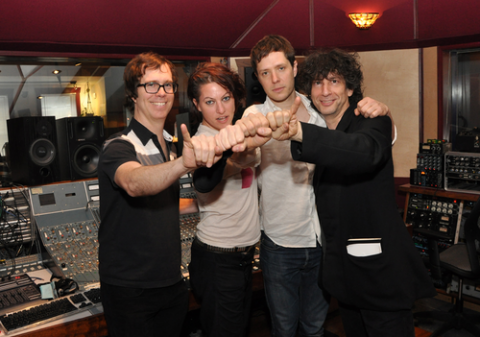
In the end, the group records only six songs, but no one seems to have any problems with that. From left: Ben Folds, Palmer, Damian Kulash, Neil Gaiman.
Photo by Phil Farnsworth
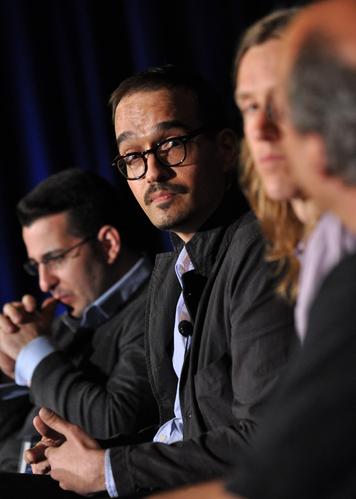
Mark Piibe, executive VP of digital business development at EMI, discusses issues with Berklee Media's Dave Kusek.
Photo by Phil Farnsworth
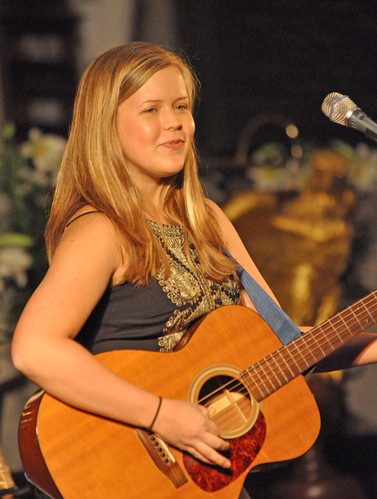
Graduating singer-songwriter Emily Elbert plays some weird old-fashioned wooden thing with strings.
Photo by Phil Farnsworth
Unlike some of his colleagues in the music industry, Lyor Cohen is an optimist.
Cohen, the onetime tour manager for Run-D.M.C. and the Beastie Boys who now runs Warner Music, wakes up thinking that maybe this is the day—the day he happens upon a piece of music that takes him "on a magic carpet ride."
If the music business has lost sight of such transcendence due to the vexing changes that have dominated the industry in recent years, Rethink Music was organized to propose how to get it back. The April 25–27 conference, with Cohen as a featured speaker, was cosponsored by Berklee and MIDEM, in association with the Berkman Center for Internet and Society at Harvard University and Harvard Business School.
Berklee president Roger H. Brown kicked off the conference with the hope that Rethink Music would refrain from the usual hand-wringing about how downloading has killed the business in favor of producing solutions for music and musicians.
In interviews, presentations, and panel discussions, participants offered imaginative new visions for the music business, with a particular focus on deeper explorations of social media and the fast-growing "direct to fan" business model.
The tone of the conference may have been set during the first panel discussion: "Never blame the customer," read a Twitter post projected onto a big screen.
Instead, participants focused on ways that cheap and free music can create paying customers and keep artists afloat—without the raft of the $15 plastic disc.
Venture capitalist Peter Gotcher, a Berklee trustee who has been instrumental in the development of Pro Tools and the popular direct-to-fan platform Topspin, argued that the so-called "freemium" model—in which recording artists can let potential fans sample their music free of charge, then identify loyal fans who will pay to support the artist—represents "the cheapest customer acquisition cost ever," given how inexpensively musicians can now record themselves and deliver their music using computers.
The idea is "to get as many people in the funnel as possible," Gotcher said. "Then you manage the conversion process. And suddenly the $10 fan becomes the $100 fan."
Discussing the concept of on-demand music—subscription services that offer subscribers unlimited access to vast libraries of music "in the cloud"—Island Def Jam digital development executive Jon Vanhala seconded the notion that asking "How do we compete with free?" is "the wrong question." Clearly, consumers will continue to access free music where they can find it. The challenge, many agreed, is to figure out how to build a superior experience that will convince a user to subscribe to your service.
Examples abounded. In one of several demonstrations, the founder of Root Music described his company's product, which helps recording artists create effective interfaces on Facebook. In another presentation, the cofounder of Next Big Sound, an internet analytics company that recently helped Billboard create its "Social 50" chart, explained his vision for building and identifying success through social media.
Boston-based NuevoStage encourages a dialogue between fans and performing artists to book venues on "dark" nights when no event is scheduled, creating demand that would increase live-music attendance figures. The conference organizers were sufficiently impressed to award the cofounders the $50,000 first prize in Rethink's business model competition.
Innovation wasn't just in the social media and financial realms. Keynote speaker Tod Machover of MIT's Media Lab showed footage of the latest "hyperinstruments" that allow human beings to express themselves with music, including the ability to create full orchestral scores intuitively. Machover saw potentially great implications for our mental and physical well-being via what he called the "composer-physician hybrid."
And in the highest-profile component of the conference, an ad hoc band locked itself in a recording studio to create eight new songs in eight hours, in a live webcast. After staying until four o'clock in the morning and producing six songs on subjects ranging from origami to suicidal squirrels, Amanda Palmer, Ben Folds, and OK Go's Damian Kulash took the stage to talk about the experience.
Check out the 8in8 album.
Writer/lead lyricist Neil Gaiman said, "We like the way it demythologized the process" of songwriting. After one blog post belittled the project before it even started, Gaiman joked that the pan "compressed the process" of record reviewing.
Folds likened the challenge to his first experience with Myspace, when the record business was still leery about its artists interacting directly with their fans. "You were always told what wouldn't work," he said, calling the rapid changes in the industry brought about by the internet "liberating."
So what will work for the traditional record business? During his Q&A, Cohen stressed that the only way major labels such as Warner can remain relevant will be to create what he called "buoyancy" or flexibility.
"We have no natural barrier of entry anymore," said the CEO. Anyone can now record their own music and make it available online. If the major-label music industry is to survive, it must streamline itself—fewer artists, fewer releases—and focus on the development of those acts it retains.
It's still a vibrant field, Cohen insisted: "I believe we're in the magic-capturing business," he said. The participants at Rethink Music proved they are committed to building better butterfly nets.
